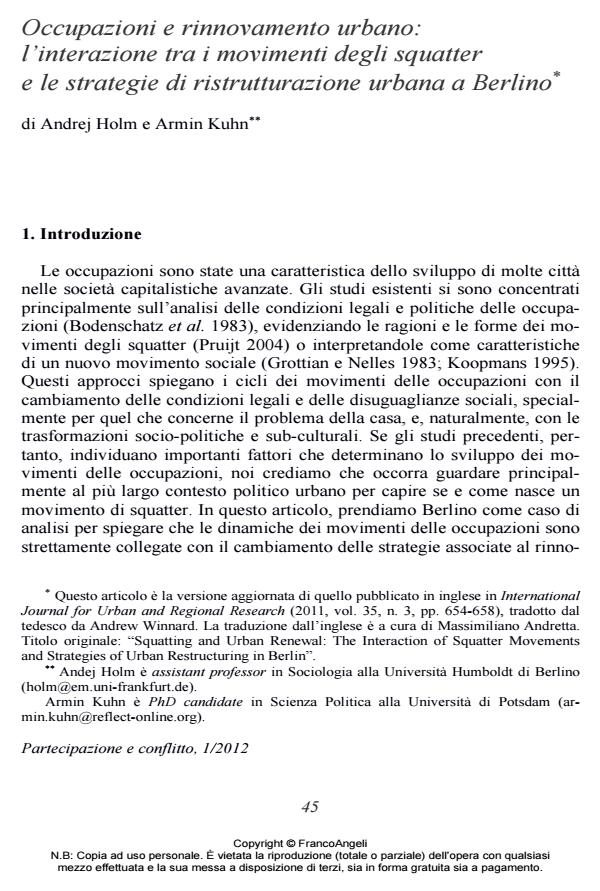Occupazioni e rinnovamento urbano: l’interazione tra i movimenti degli squatter e le strategie di ristrutturazione urbana a Berlino
Titolo Rivista PARTECIPAZIONE E CONFLITTO
Autori/Curatori Andrej Holm, Armin Kuhn
Anno di pubblicazione 2012 Fascicolo 2012/1 Lingua Italiano
Numero pagine 24 P. 45-68 Dimensione file 147 KB
DOI 10.3280/PACO2012-001003
Il DOI è il codice a barre della proprietà intellettuale: per saperne di più
clicca qui
Qui sotto puoi vedere in anteprima la prima pagina di questo articolo.
Se questo articolo ti interessa, lo puoi acquistare (e scaricare in formato pdf) seguendo le facili indicazioni per acquistare il download credit. Acquista Download Credits per scaricare questo Articolo in formato PDF

FrancoAngeli è membro della Publishers International Linking Association, Inc (PILA)associazione indipendente e non profit per facilitare (attraverso i servizi tecnologici implementati da CrossRef.org) l’accesso degli studiosi ai contenuti digitali nelle pubblicazioni professionali e scientifiche
Squatting as a housing strategy and as a tool of urban social movements accompanies the development of capitalist cities worldwide. We argue that the dynamics of squatter movements are directly connected to strategies of urban renewal in that movement conjunctures occur when urban regimes are in crisis. An analysis of the history of Berlin squatter movements, their political context and their effects on urban policies since the 1970s, clearly shows how massive mobilizations at the beginning of the 1980s and in the early 1990s developed in a context of transition in regimes of urban renewal. The crisis of Fordist city planning at the end of the 1970s provoked a movement of ‘rehab squatting’ (Instandbesetzung), which contributed to the institutionalization of ‘cautious urban renewal’ (behutsame Stadterneuerung) in an important way. The second rupture in Berlin’s urban renewal became apparent in 1989 and 1990, when the necessity of restoring whole inner-city districts constituted a new, budget-straining challenge for urban policymaking. Whilst in the 1980s the squatter movement became a central condition for and a political factor of the transition to ‘cautious urban renewal’, in the 1990s largescale squatting - mainly in the eastern parts of the city - is better understood as an alien element in times of neoliberal urban restructuring.;
Keywords:Squatting, urban movements, urban renewal, housing, Germany.
Andrej Holm, Armin Kuhn, Occupazioni e rinnovamento urbano: l’interazione tra i movimenti degli squatter e le strategie di ristrutturazione urbana a Berlino in "PARTECIPAZIONE E CONFLITTO" 1/2012, pp 45-68, DOI: 10.3280/PACO2012-001003